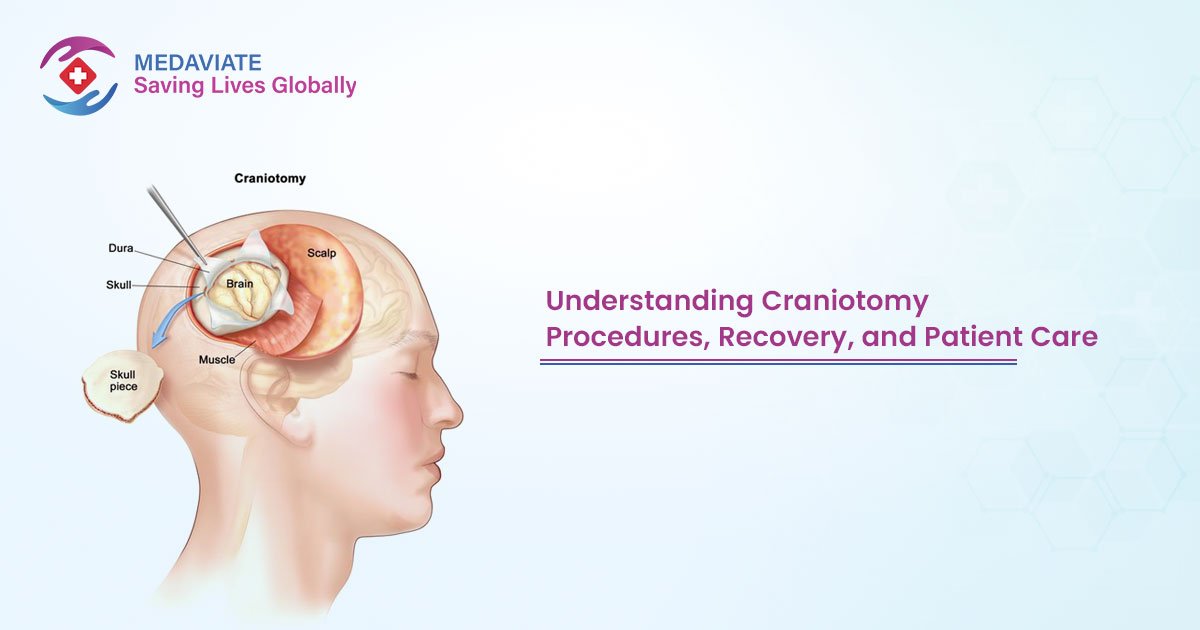- +91-97110 81535
- contact@medaviate.com
- Appointment

Understanding Craniotomy | Procedures, Recovery, and Patient Care
A craniotomy is a surgical procedure involving the removal of a portion of the skull to access the brain. This procedure is commonly performed to treat brain tumours, aneurysms, traumatic brain injuries, and other neurological conditions. Understanding the craniotomy procedure, the recovery process and patient care is crucial for patients and their families. This blog aims to provide comprehensive information on craniotomies, focusing on the procedures, recovery, and patient care.
What is a Craniotomy ?
A craniotomy involves the temporary removal of a bone flap from the skull to gain access to the brain. The procedure can vary in complexity depending on the condition being treated. The bone flap is typically replaced at the end of the surgery using plates and screws. Craniotomies can be categorized into different types based on the location and size of the bone flap removed. The primary goal is to provide a safe and effective route for surgeons to perform necessary interventions on the brain.
Why Choose India for Craniotomy ?
India is renowned for its advanced medical facilities and highly skilled neurosurgeons. Hospitals offering Brain Tumor Surgery in India are equipped with state-of-the-art technology and adhere to international standards of care. The cost of medical treatment in India is also relatively affordable, making it an attractive destination for patients worldwide.
Procedures Involved in a Craniotomy
Preoperative Preparation
The patient undergoes a series of diagnostic tests such as MRI, CT scans, and angiography to determine the exact location and extent of the brain abnormality.
Blood tests and physical examinations are conducted to ensure the patient is fit for surgery.
The medical team explains the procedure, potential risks, and benefits to the patient and obtains informed consent.
Surgical Procedure
The patient is placed under general anaesthesia.
The surgeon makes an incision in the scalp and temporarily removes a portion of the skull.
Depending on the condition, the surgeon may remove a brain tumour, repair an aneurysm, or address other neurological issues.
Once the necessary surgical intervention is complete, the bone flap is secured back in place, and the incision is closed.
Postoperative Care
After surgery, the patient is closely monitored in the intensive care unit (ICU) to ensure stability and address any immediate complications.
Pain management, infection prevention, and monitoring of neurological functions are prioritized.
The patient gradually transitions from the ICU to a regular hospital room as recovery progresses.
Recovery Process
The recovery process following a craniotomy can vary significantly based on the complexity of the surgery and the patient’s overall health. These are a few broad aspects of the healing procedure.
- Hospital Stay: The initial recovery period involves a hospital stay of about one to two weeks. During this time, the medical team monitors the patient for signs of infection, bleeding, and other complications.
- Rehabilitation: Rehabilitation may include physical therapy, occupational therapy, and speech therapy to help the patient regain lost functions. Cognitive and emotional support may also be provided to address any psychological impacts of the surgery.
- Follow-Up Care: Regular follow-up appointments are essential to monitor the patient’s progress and detect any potential issues early. Imaging tests such as MRI or CT scans may be performed to ensure the surgical site is healing properly and to monitor for any recurrence of the underlying condition.
Patient Care and Support with Medaviate
Navigating the complexities of a craniotomy can be challenging for patients and their families. This is where Medaviate, a leading healthcare facilitator, plays a crucial role. Medaviate offers a range of services to ensure that patients receive the best possible care.
- Consultations in Top Hospitals: Medaviate facilitates consultations with top doctors at the Best Neurology Hospital In India, ensuring patients receive expert opinions and treatment plans.
- Prioritized Appointment Procedure: Medaviate helps prioritize the appointment procedure, reducing waiting times and ensuring timely medical attention.
- Travel and Accommodation Options: For international patients, Medaviate provides assistance with travel and accommodation options, making the entire process seamless and stress-free.
Conclusion
A craniotomy is a complex but potentially life-saving procedure that requires expert surgical skills and comprehensive postoperative care. Understanding the procedures, recovery process, and patient care involved in a craniotomy can help patients and their families navigate this challenging journey. Medaviate plays a vital role in facilitating consultations with top doctors and providing essential support services, ensuring patients receive the best possible care. For those considering a craniotomy, India offers some of the best medical facilities and neurosurgeons, making it a preferred choice for Brain Surgery in India.
